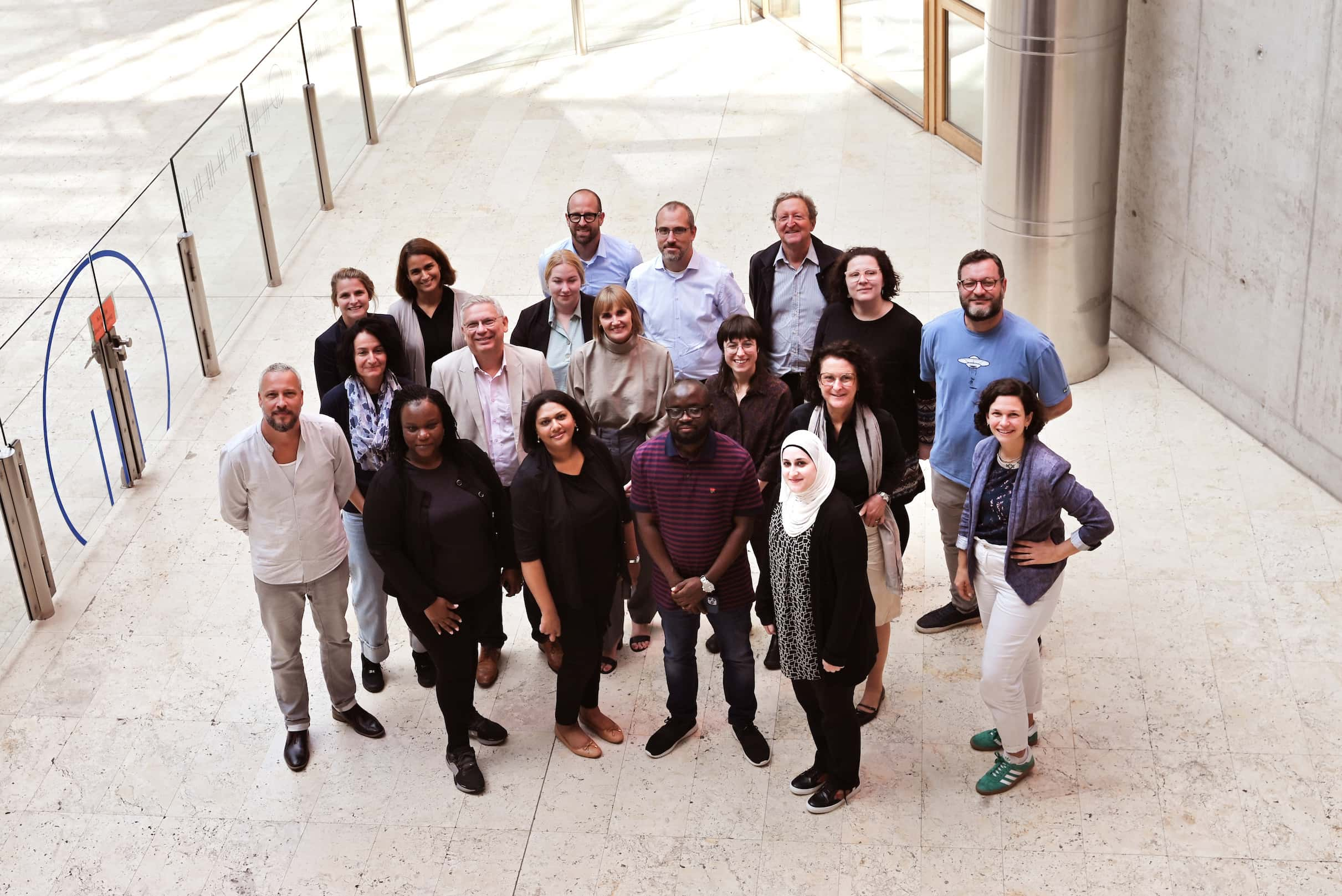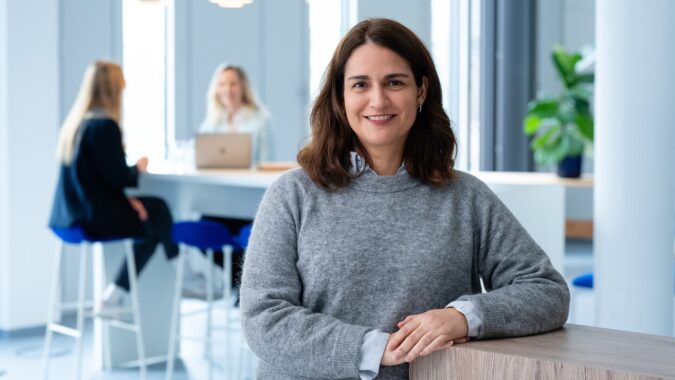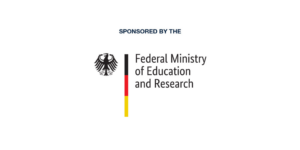
Master in Vocational Education and Innovation
| Language: | Englisch |
| Location: | München, Remote |
| Duration: | 5 semesters |
| Start: | Next intake to be announced |
Are you ready for the next step on your professional path?
The part-time Master’s degree program “Vocational Education and Innovation” (M.Sc.) is a blended-learning program for international professionals in the field of vocational education and training (VET). You will study at the Technical University of Munich, one of the world’s leading universities. After successfully completing your studies, you will be ideally equipped for a wide range of tasks in shaping change and introducing innovations. Take the next step in your education and shape the future of vocational education and training!
JOIN OUR UNIQUE MASTER’S PROGRAM AND ENJOY MANY BENEFITS
- Dive deep into vocational education and training in an international context.
- Develop competencies in the design, administration and management of vocational training processes.
- Get hands-on experience on state-of-the-art practices in vocational education and training.
- Experience German VET institutions first hand as part of the job shadowing component.
- Gain insight into the expertise and experience of the German dual vocational education and training system.
- Transfer your acquired knowledge and skills to your workplace in your home country.
Want to find out more?
Master Vocational Education and Innovation TUM
The innovative international master’s program Vocational Education and Innovation TUM introduces students to state-of the-art concepts and tools from the field of vocational education and training (VET).
Overview
-
Students from all over the world
Our students are experts in vocational education and training, leveraging their diverse backgrounds and experiences. Through the network activities during the program, they become part of a global network, enhancing their career prospects and opportunities.
-
Flexibility in time & location: Primarily online
As a full-time professional, this study program offers you the flexibility of online learning with only one week of onsite sessions in Munich every semester for the first four semesters.
Additionally, during the third semester, you will engage in one week of job shadowing, enriching your learning experience and practical skills.
-
Mentoring and job shadowing
The job shadowing during the course of your studies aims to provide you with firsthand insights into the diverse structures, organizations, and concepts of the German dual VET system. Comprehensive mentoring takes place on three levels: individual, peer-group mentoring, and mentoring focused on key performance areas, ensuring you receive tailored support every step of the way.
-
High level of application
Together with a high number of international experienced professionals, apply to this cutting-edge study program. Your diverse perspectives and individual experiences can significantly contribute to our vibrant global community.
Partners
The Federal Ministry of Education and Research in Germany funds this innovative project and provides free participation for the first intake 2024/25 for all students accepted to the Master “Vocational Education and Innovation”. The funding enables free participation in the degree program.
Program Overview
You can find all the important information about the program here. Find out below what the program aims to achieve, the exact details of the courses, and what career opportunities await you.
Details
| Program: | Vocational Education and Innovation |
| Degree: | Master of Science (M.Sc.), awarded by the Technical University of Munich |
| Target group: | The course is aimed at a broad spectrum of professionals. Some work in or aspire to leading and/or managerial positions in the field of vocational education and training, for example in ministries, chambers, companies and associations, while others have teaching assignments in educational institutions such as vocational schools and universities. |
| Tuition fees: | No tuition fees will be charged for the 2024/25 cohort due to funding from the Federal Ministry of Education and Research. |
| Program language: | English (If applicants’ education was not in English, proof of sufficient English language skills is expected). |
| Location: | Mainly online, apart from one week per semester on site in Munich (first four semesters), plus one week of job shadowing in the third semester. |
| Format & Duration: | Part-time format, 5 semesters incl. Master’s thesis |
| Study requirements: | A Bachelor’s degree after at least six semesters of study or an equivalent degree in a subject relevant to vocational training is required. At least one year of professional experience is required. |
Study Objectives
With this program, you will be competent in designing, administering, and managing vocational training processes. Through hands-on experience in German VET institutions, you’ll gain insights into their dual vocational education system and transfer this knowledge to your workplace in your home country.
Career Opportunities
As a graduate of this master’s program, you will be well-prepared for a wide range of professional contexts, ready to lead transformation and introduce innovation. Take the next step in your education and shape the future of VET!
Study Contents
The program consists of nine core modules (52 ECTS) taught through the first three semesters, one specialisation module (8 credits) as part of the fourth semester, and writing a Master’s Thesis (30 ECTS) in the fourth and fifth semester.
– Compulsory Modules (52 ECTS)
– Specialisation Module (8 ECTS)
– Master’s Thesis (30 ECTS)
Master of Vocational Education and Innovation
Models and Theories in VET
- Learn more about models and theories of the vocational education system of the past.
- Focus on current topics of discussion in VET.
- Evaluate the future potential for change that can arise as a result of current developments in the VET system.
Fundamentals in Research in VET
- Acquire a basic understanding of tasks, issues, and methods of empirical research in VET.
- Learn how to elaborate on theory and develop your own research question.
Teaching and Learning in VET
- Analyze the concept of competence.
- Learn how competences are developed.
- Understand how teaching-learning processes should be designed.
VET Structure and Organization
- Learn more about the structure, functions, and mechanisms of the German VET system.
- Evaluate the differences between the German and your national VET system.
- Reflect the German VET system in the context of its biography and historical developments.
Digital Transformation in VET
- Learn more about the innovation of digital technologies and its potential for change in the VET system.
- Focus on current concepts and fundamental issues of digitalization in VET.
- Evaluate the potential for future development by current trends in the digitalization of the VET system.
- Workplace Learning: Get an overview of theoretical conceptions and practical skills in the context of workplace learning.
- Learn about the impact of formal and informal learning at workplaces.
- Evaluate trends and scenarios for modern people development in a digital world.
VET Concepts and Approach from an International Perspective
- Learn more about the structure, functions, and mechanisms of your national VET system.
- Reflect on your national VET system in the context of its historical, political, and social background.
- Evaluate on differences between your national and the German VET system and its potential for transferability.
People and Organizational Development
- Gain insights into people and organizational development, leadership, and change management.
- Discuss current trends in the area of people and organization development.
- Transfer theories, models, and concepts to your own field of work.
Mentoring and Job Shadowing
- Benefit from three types of mentoring: Individual Professional Mentoring, Key Performance Area Mentoring, and Peer Group Mentoring to self-reflect and define strengths.
- Acquire hands-on experience by “shadowing” a professional at a German VET organization in their working environment.
- Observe and learn from the hosts’ everyday working routine and accompany them to meetings or other events.
Teaching and Learning in VET
- Put in practice necessary curricular transformations
- Integrate specific vocational and practical contexts into VET learning
- Develop a teaching and learning concept for your work place
Research in VET
- Learn about basic statistical and qualitative research procedures as well as how to
apply this to data sets - Experience a complete research process within this seminar
Management and Leadership
- Dive deep into leadership research and write your own leadership diary
- Discuss about current trends in the field of management and leadership linked to
application-oriented case studies - Transfer the strategic management process to your own company context
Governance in VET
- Get insight into current areas of discussion in international organizations and
companies related to governance - Understand how opportunities for implementation as well as regulations are
connected to social/economic constraints and decision-making stakeholders
Master Thesis
- Demonstrate the ability to formulate and investigate a scientific problem from the
field of vocational education - Collect and analyze data, present results and draw conclusions in a scientific manner

Teaching and Learning
Throughout the course of the study, you are supported by a multilevel mentoring program: Individual professional mentoring, peer-group mentoring, and key performance areas mentoring.
You will work alongside renowned professionals in the field of VET and get hands-on experience on state-of-the-art practices and in an international context. The professional Master is a blended learning program, with an inquiry-based approach. For you, this translates into an active learning experience, being engaged in real-life professional scenarios and problem-solving activities. These revolve around the four key performance areas of the specialization modules.
In line with the inquiry-based learning, comes the work-based learning in the form of job shadowing. The idea of job shadowing is to give you contextualized, concrete, first-hand insights into the diverse structures, organizations, and concepts of the German dual VET system.
Download for the Master in Vocational Education and Innovation flyer
"*" indicates required fields
Our Project Team
What Our Students Say
Application
1. Application Documents
- First university degree (Bachelor or equivalent, 210 credits) in the fields of pedagogy, business, culture, social, technology or natural sciences comprised of seven semesters
OR - First university degree (Bachelor or equivalent, at least 180 credits) in the fields of pedagogy, business, culture, social, technology or natural sciences and passing of the assessment procedure (oral exam, 30 minutes)
- Up-to-date academic transcripts (at least 180 credits) and GPA
- Proof of one year work of full-time experience in the field of VET (by conformation or references from your current and/or former employers that specifically mention start and end dates)
- Current CV in English (no chronological gaps, on a monthly basis. Every month since secondary school should somehow be accounted for)
- Letter of Motivation in English
- Copy of Passport
- For students whose language of education is not English: proof of an adequate level of English proficiency.
2. Aptitude Assessment
Those applicants who fulfill the general qualification requirements will be admitted to the aptitude assessment.
- In the first stage, the grade of the Bachelor’s degree, the work experience, and the motivation letter, will be evaluated using a point system.
- Depending on the number of points accumulated, applicants are either immediately admitted, rejected, or invited to a 20-minute interview (second stage). The interviews will take place virtually.
- Depending on the number of ECTS obtained in the Bachelor’s degree, applicants will additionally need to take an oral exam (30 minutes) if the amount of ECTS lies between 180 and 210 ECTS.
3. Assessment Procedure
To start with your application, sign up for an account in TUMonline and then select:
- Type of studies: Executive Master’s Program
- Intended degree: Master of Science
- Degree programme: Vocational Education and Innovation
Find a guide and sign up for TUMonline here: Guide for TUMonline — Sign up in TUMonline
Admission
Does my Bachelor degree certificate need to be recognized by the German Higher Education Institutions if I have graduated from a university outside the EU?
An initial orientation guide on the acceptance of your qualification for university entrance can be found at anabin. For more specific information please contact the program’s team. Also, we recommend non-EU students to apply as early as possible.
As an international applicant, do I need to apply for preliminary documentation (VPD) via uni-assist?
Due to the limited time of the application period, applicants do not need preliminary documentation (VPD) before applying for this program. If you are an international student, please submit your documents directly via TUMonline. Please, check the TUM guidelines for international applicants.
Will I have to go through an admission interview?
Those applicants who fulfil the qualification requirements will be admitted to the aptitude assessment. In the first stage, the final grade of your Bachelor’s program as well as your motivation letter, will be evaluated using a point system. Depending on the number of points accumulated, applicants are either immediately admitted, rejected or invited to an interview (second stage).
If your education has not been conducted in the English language, the demonstration of evidence of an adequate level of English proficiency will be expected. Learn more about the TUM language requirements here:
Prerequisites
You can find any information on the documents you need to submit under “Application Formalities”. Additionally, exclusively for the Master program Vocational Education and Innovation you should submit a proof of at least 1 year work experience, in the field of vocational education.
On your CV, please include all your previous work-experience. In addition, as part of the qualification requirements, you should submit a proof of at least one year work experience in the field of vocational education.
For this program, you may prove your English language requirements either by the recognized English language certificates or through the language of instruction in your previous school or academic education. For details, please visit the TUM Language Certificates webpage.
Fees and Financing
The have been no tuition fees for the intake 2024/25 because the first intake of the program is funded by the German Federal Ministry of Education and Research.
You may learn more at https://www.tum.de/en/studies/fees. Also, DAAD offers scholarships you may apply for. Additionally, you may look for national funding opportunities in your home country or through your employer.
Yes, because the program is part-time.
Program-Related Questions
The Master of Arts focuses more on humanities and theoretical understanding. The Master of Science focuses more on scientific or technical expertise. Master of Science programs focus on disciplines like Sciences, Engineering, Technology, Mathematics, Medicine, and some Social Sciences, such as Finance, Psychology, Sociology, and others. To earn an M.Sc. degree, you normally have to write a scientific thesis.
The study program team will ensure that there are enough places for all the participants and will communicate in advance the necessary arrangements. Students’ will be responsible for the final choice, the direct communication, and the final arrangements though.
No, it’s not, as they have different characteristics. For more details, see the module description.
Yes, it is a compulsory module.
Presence and Accommodation
It is necessary only during the four weeks on-site (one in each semester) and an additional one week of job-shadowing.
If you are in Munich, you may use university WIFI and study rooms. For more information, please, visit https://www.it.tum.de/en/it/faq/internet-access-eduroam-vpn-wifi/. While engaging on the self-paced online platform you need to make sure to have a stable internet connection.
General Questions
TUM has an International Office, where you may reach out to a contact person, who may be able to navigate you through your issue. For more information, please, follow this link.

Your contact
Anna Trikoili
Research Assistant & Program Manager
Phone: +49 89 289 26752
E-Mail: master.vet@lll.tum.de






